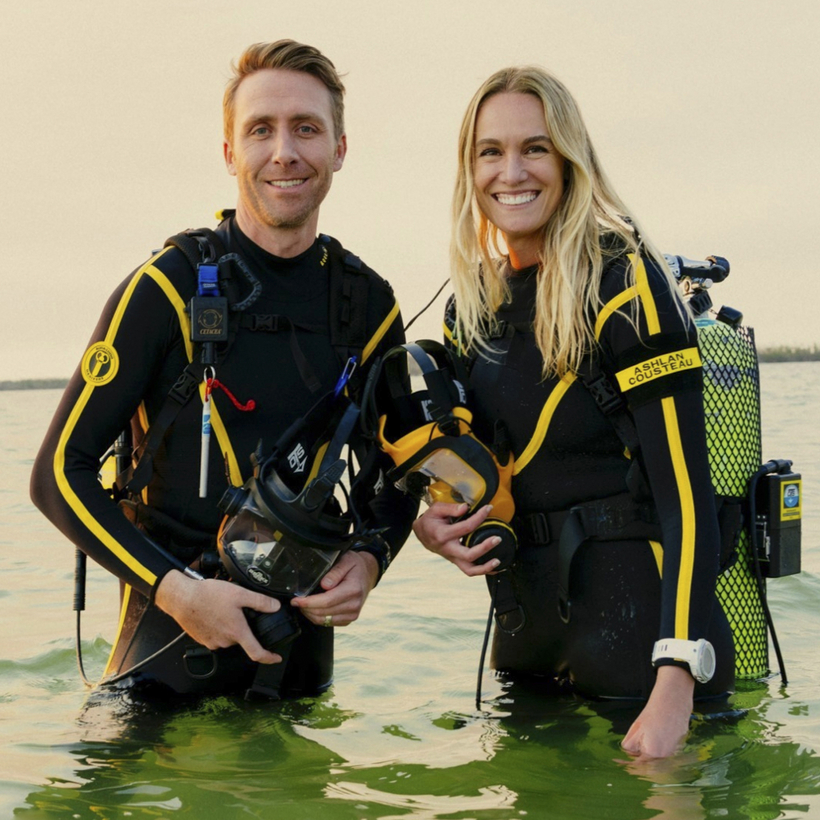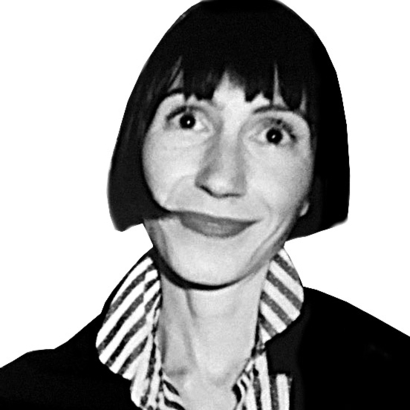On a dreary winter morning in Manhattan, as the United Nations Climate Change Conference (COP26) plodded on in even drearier Glasgow, Philippe Cousteau Jr., the grandson of the legendary French oceanographer Jacques Cousteau, along with his wife and business partner, Ashlan, were making the rounds at a cannabis conference.
They’d chosen the event to unveil their own Earth-saving initiative: SeaWeed Naturals, a mission-driven brand comprising a trim lineup of skin balms, tinctures, and gummies meant to combine the healthful and beautifying benefits of marine botanicals with the wellness-focused aspects of cannabis. Did somebody order the surf and turf?
For a family member whose last name has remained synonymous with underwater exploration and marine conservation—ever since Jacques, a fearless and lithesome adventurer, took to the waters with a camera and his newly developed Aqua-Lung in the early 60s—peddling a product that’s still illegal in most states marks a venture into uncharted territory.
“A cannabis line from a Cousteau is very unexpected,” muses Ashlan over the phone from the couple’s home in Los Angeles, California. A former model and correspondent for E! News, she credits the 2010 BP oil spill for her own professional pivot—and for the chance meeting of her now husband.

“That may have been the best thing to come out of the oil spill,” says Philippe, who had spent several weeks scuba-diving into the Gulf of Mexico’s dark, murky abyss to document the damage. He later met Ashlan at a conference in Los Angeles, during which Philippe gave a speech about his work in the gulf. Together the telegenic pair have trailed reef sharks for the Discovery Channel and appeared in the Travel Channel series Caribbean Pirate Treasure.
Philippe, an author and longtime conservationist, who also founded EarthEcho International, a sustainability-focused educational organization for youths, contends that the new family business is primed to pull in big bucks by tapping into a wellspring of consumers rather than entreating donors.
The ingredients are the bait: kelp, seaweed, and marine algae, which the Cousteaus secure from aquaculture farms in Maine, are all densely rich in collagen, amino acids, and vitamin C—superfoods for anyone desiring smoother, more supple, and hydrated skin. And in its natural habitat, algae can eat up more carbon dioxide than trees do, making it a promising tool in the deceleration of climate change.
“That may have been the best thing to come out of the oil spill.”
And then there’s the brand’s other namesake “weed,” a super-ingredient in its own right, for its moneymaking potential, if anything. “This is a multi-billion-dollar industry that’s going to grow exponentially over the next seven years,” says Philippe.
As the current wave of legalizations sweeps across several more states, the cannabis market is poised to be valued at as much as $30 billion next year. While some of SeaWeed Naturals’ conscious consumers may sleep easier knowing their skin-care regimen is contributing to the blue economy, others may simply crave a better night’s sleep. There’s a gummy for that.

“My grandfather and my father were problem solvers above anything else. They were always trying to think of new ways to approach old problems,” says Philippe. The still-beating heart of his family’s legacy, he argues, is a curious spirit and a hunger for innovation. Nearly 25 years after Jacques Cousteau’s death, his legend continues to loom large; a new biographical documentary, Becoming Cousteau, was released in October.
The nostalgic hero worship is sweet, but for Philippe and the other scions of his generation—his sister, Alexandra, and cousins, Fabien and Céline—potentially counterproductive. The world doesn’t need another Cousteau waxing rhapsodic about Mother Nature’s beauty for viewers at home but one savvily attuned to the current wants and interests of a new and younger generation. “We need to make sure we’re talking to the non-converted,” insists Ashlan. Perhaps by proffering a brand of seaweed-laced edibles? That’s one way to do it.
Philippe’s older sister Alexandra, meanwhile, heads up Oceans 2050, a research-based nonprofit that’s racing to restore the Earth’s aquaculture by the year 2050. Fabien, an oceanographer, is currently immersed in the ongoing construction of Proteus, the world’s largest underwater research station. Céline, an environmentalist and documentary filmmaker who has also dabbled in jewelry and fashion design, is in the final phase of launching an organization, the Javari Project, following her 2018 film, Tribes on the Edge. It is dedicated to the protection and preservation of the Javari Valley, the second-largest indigenous territory in the Brazilian Amazon.

As a team of environmental crusaders, they make a powerful family brand with a built-in household name. On a recent phone call, however, Céline (who lives in France) dismissed the idea of a collaboration among cousins. “We’re touching different audiences, and that’s what we need to do. For us to come together and do one project would probably be one of those ‘awww’ moments that people want out of fiction films. But is that going to be more effective than what we’re currently doing? I don’t think so.”
For now, Philippe and Ashlan are devoted to getting SeaWeed Naturals off the ground in California, and eventually in other states. “To use one of Philippe’s grandfather’s quotes: ‘We’re all in the same boat,’” says Ashlan. “At the end of the day, we just want the world to be better and healthier for our children and everyone’s children. That’s what gets us excited.” And a little bit high.
Laura Neilson, a New York–based writer, frequently covers fashion and style, travel, and design for The New York Times, WSJ. magazine, and The Wall Street Journal, among other publications


